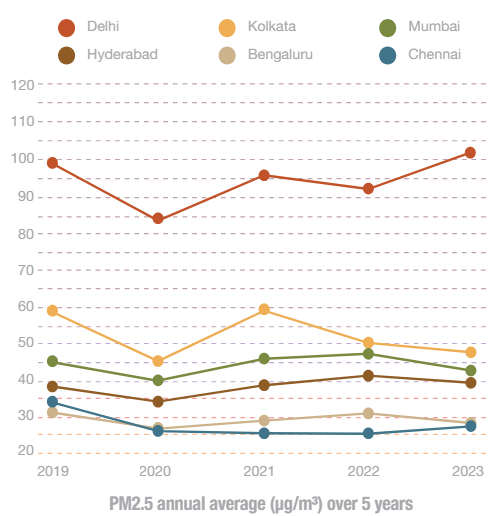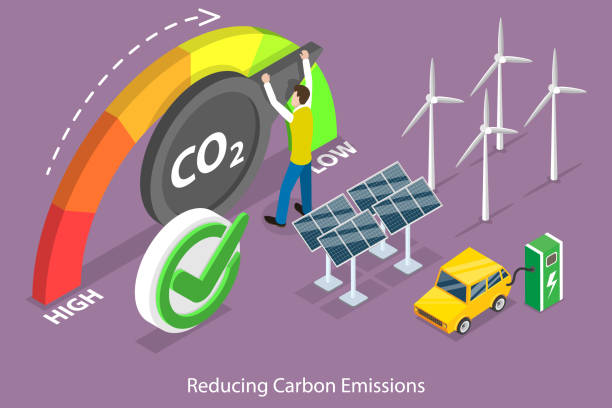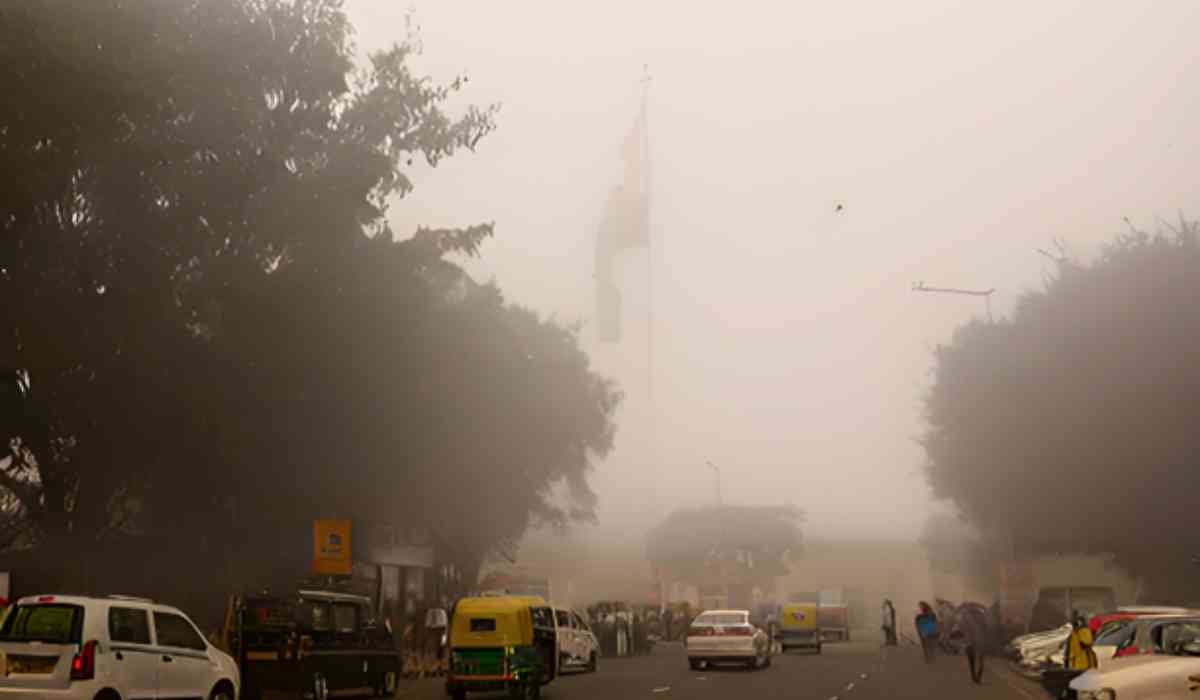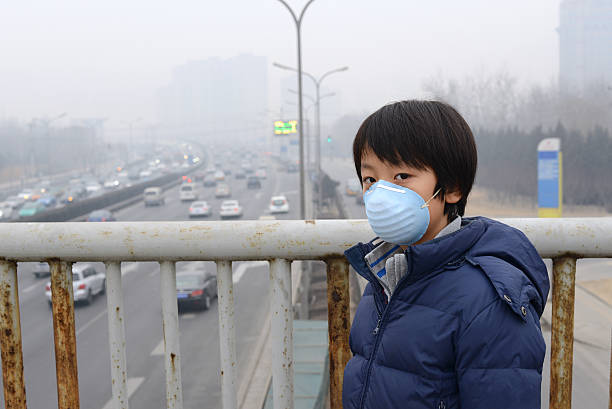Delhi's air quality continues to be a cause for grave concern, with a new report naming it the most polluted capital city in the world for 2023. The report, by Swiss organisation IQAir, reveals a worrying trend for India's air quality. The country ranked third globally in terms of poor air quality, following Bangladesh and Pakistan. This is a significant jump from its eighth position in 2022.
Begusarai tops the charts; Delhi follows closely
While Delhi holds the dubious distinction of being the most polluted capital, another Indian city, Begusarai in Bihar, emerged as the world's most polluted metropolitan area. Begusarai's average PM2.5 concentration, a measure of harmful fine particulate matter, was a staggering 118.9 micrograms per cubic metre.
_1710839514.png)
Deteriorating air quality in Delhi
Delhi's own PM2.5 levels have also worsened, rising from 89.1 micrograms per cubic metre in 2022 to 92.7 micrograms per cubic metre in 2023. This highlights the urgent need for stricter measures to curb air pollution in the national capital.
Health Concerns at the Forefront
The report emphasises the severe health risks associated with air pollution. An estimated 1.36 billion Indians are exposed to PM2.5 concentrations exceeding the World Health Organisation's (WHO) safe limit of 5 micrograms per cubic metre. This exposure can lead to a multitude of health problems, including respiratory illnesses, heart disease, and even cancer.

A Silent Killer: Studies Reveal Devastating Effects
Air pollution isn't some abstract threat; it's a silent killer with a mountain of evidence against it. A 2021 study The Lancet Planetary Health found that air pollution exposure was linked to an estimated 1.67 million deaths in India in 2019 alone. That's nearly 4,600 deaths every single day.
Children are especially vulnerable. A 2020 study by the Public Health Research Foundation of India linked chronic exposure to air pollution to stunted growth and reduced lung function in children. This can have lasting health consequences throughout their lives.
A Cry from Nature Unheeded
But this isn't just about statistics. It's a desperate plea from nature itself. We cough, we wheeze, and our lungs turn black, yet we continue to pump pollutants into the air we share. Each choked breath is a warning sign, a cry for help ignored. Listed below are some short- and long term effects that living at this pollution level can have on humans:
Short-Term Effects of Living in High Air Pollution
-
Respiratory Issues: Increased coughing, wheezing, shortness of breath, chest tightness, irritated airways.
-
Eye, Nose, and Throat Irritation: Itchy and watery eyes; burning sensations in the nose and throat.
-
Headaches, Nausea, and Dizziness: This can trigger headaches, nausea, and dizziness.
Long-Term Effects of Living in High Air Pollution
-
Chronic Obstructive Pulmonary Disease (COPD): Long-term exposure can worsen COPD, making it difficult to breathe.
-
Cardiovascular Disease: Air pollution contributes to heart attacks, strokes, and other cardiovascular issues.
-
Lung Cancer: Long-term exposure is a significant risk factor for lung cancer.
-
Cognitive Decline: Studies suggest air pollution may contribute to cognitive decline and dementia.
-
Developmental Issues in Children: Exposure during pregnancy and childhood may affect lung development, leading to respiratory problems later in life.
Building a Future We Can't Breathe In
We work hard and want to provide our kids with a better future. But if the air is poisonous, what hope is there? If the sky above is nothing but death, then skyscrapers striving for the stars become monuments to stupidity. If only a select few wealthy people are able to flee a world that we have made uninhabitable through our own actions, then even the wildest fantasies of colonising Mars turn into a cruel joke.
The time to act is NOW
The findings of this report serve as a stark reminder of the air pollution crisis in India. Urgent action is needed from policymakers and citizens alike to address this issue and ensure cleaner, healthier air for everyone. This isn't just about saving the environment; it's about saving ourselves and the future generations who deserve to inherit a world they can breathe in.
Here are some suggestions for what everyday people can do to reduce air pollution:
Reduce Reliance on Cars
-
Walk, Cycle, or Use Public Transport: Whenever possible, opt for walking, cycling, or using public transport like buses or metro trains. This significantly reduces your personal contribution to air pollution from vehicle emissions.
-
Carpool or Share Rides: If you must use a car, consider carpooling with colleagues or neighbours for work or errands. This reduces the number of vehicles on the road and lowers emissions.
-
Maintain Your Vehicle: Regularly service your car and ensure it meets emission standards. A well-maintained car produces fewer pollutants.
Be mindful of energy consumption
-
Conserve electricity: Switch off lights and electronics when not in use. Use energy-efficient appliances whenever possible. Lowering electricity consumption reduces the demand for power plants, which can be a major source of air pollution.
-
Reduce, Reuse, Recycle: Minimise waste generation. Recycle paper, plastic, and other materials. This reduces the need for production facilities that contribute to pollution.

Promote Awareness
-
Spread the Word: Talk to friends, family, and neighbours about the air pollution crisis and encourage them to adopt eco-friendly habits.
-
Support Green Initiatives: Support local organisations and initiatives working to improve air quality.
Lifestyle Changes
-
Limit Open Burning: Avoid burning leaves, trash, or other materials in the open. This releases harmful pollutants into the air.
-
Choose eco-friendly products: Opt for cleaning products and personal care items that are eco-friendly and have lower volatile organic compounds (VOCs). VOCs contribute to smog formation.
-
Plant trees: Planting trees helps absorb pollutants and improve air quality. Encourage others to plant trees in their communities.
By incorporating these simple steps into your daily routine, you can make a positive impact on Delhi's air quality. Remember, every little bit counts!
ⒸCopyright 2024. All Rights Reserved Powered by Vygr Media.























